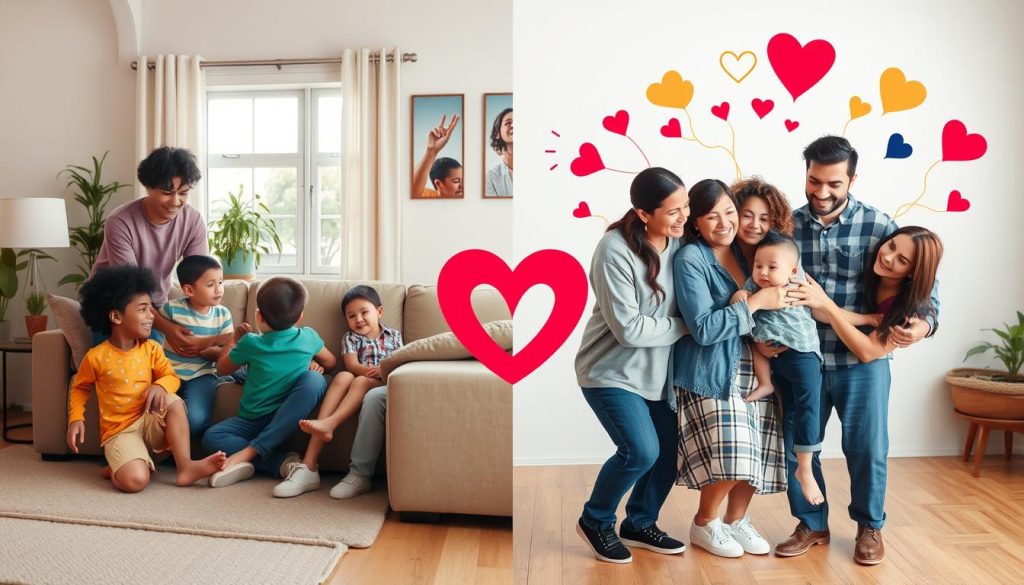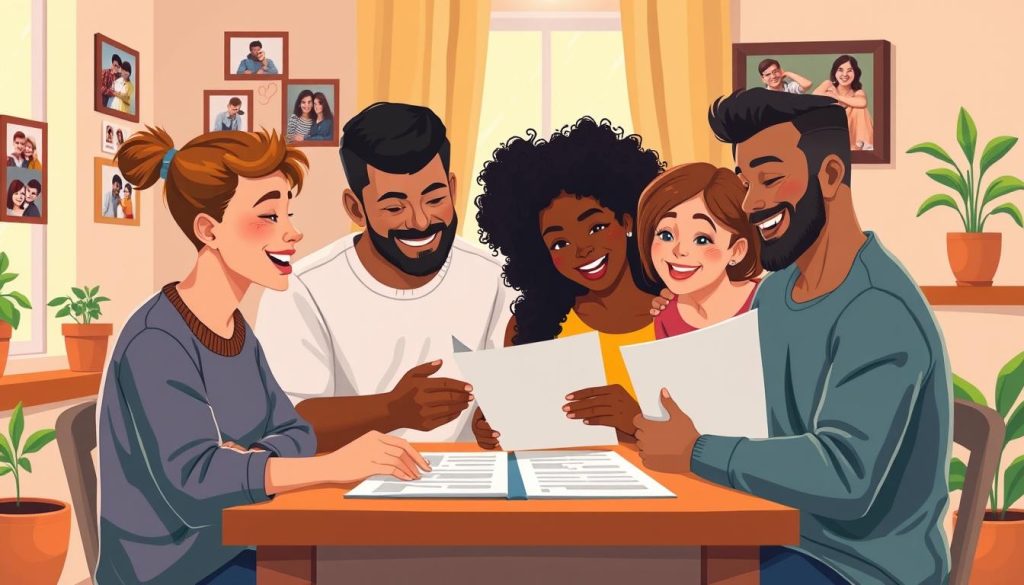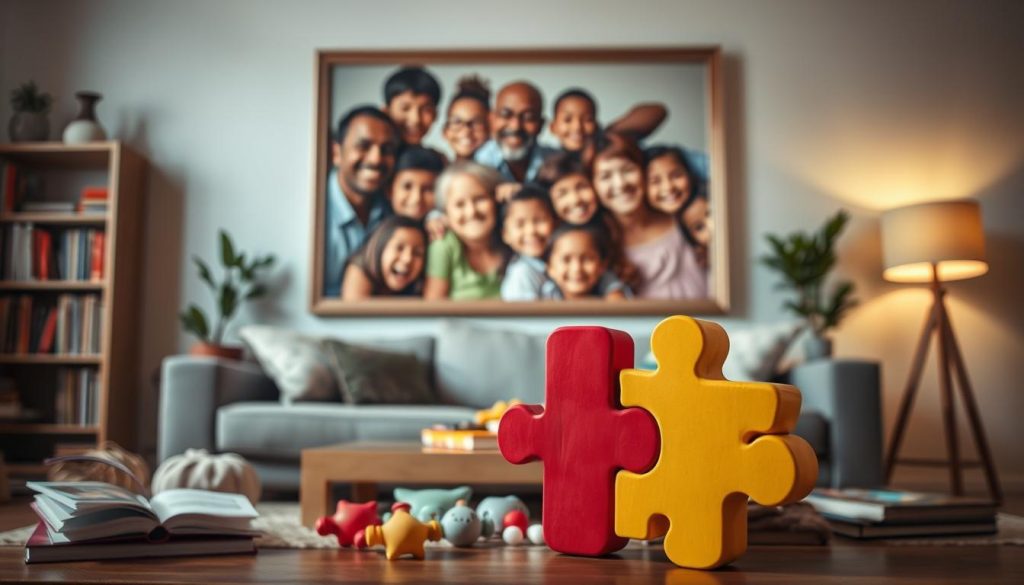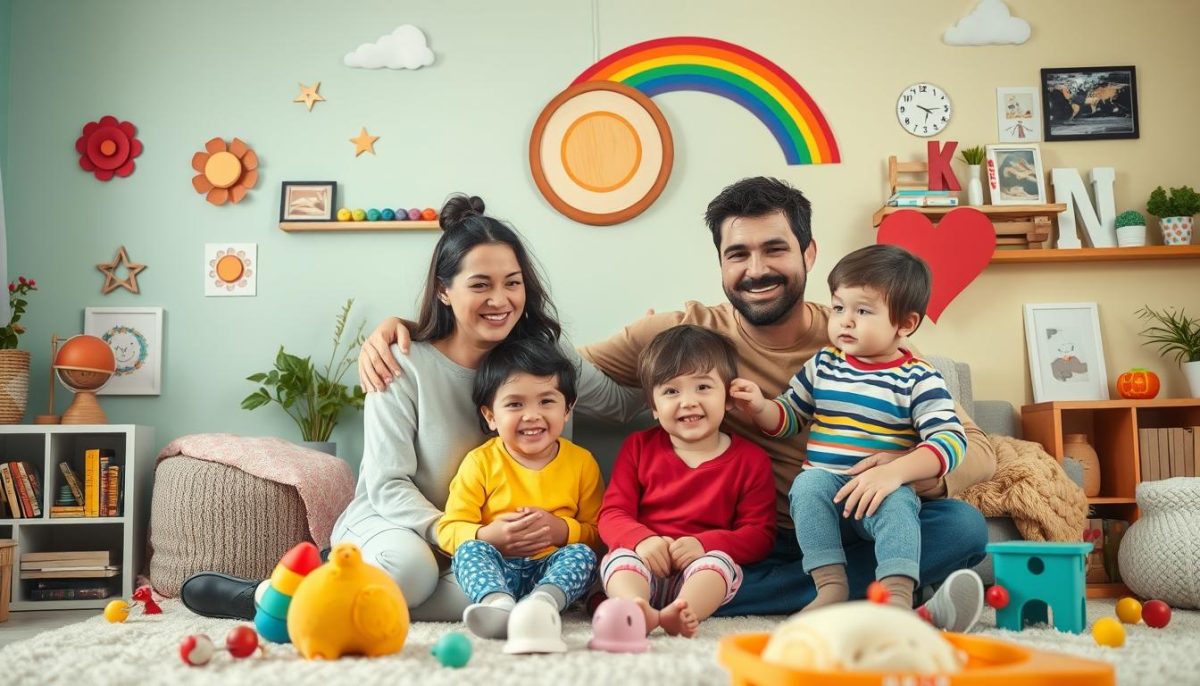In today’s world, families come in many forms, including those with LGBTQ parents. These families show love and care, proving that family isn’t just about biology. Laws have changed, allowing LGBTQ couples to adopt and be recognized as families.
This shift is a big step towards acceptance. It shows how far we’ve come in understanding what a family is. It’s all about love and care, not just who you are.
For LGBTQ individuals or couples, adopting a child is a powerful choice. It’s a chance to build a family and show the world what love looks like. In the U.S., many same-sex couples are raising kids, proving their dedication to family.
Adoption is a way for LGBTQ families to grow. They can choose from domestic or international adoption. Some even adopt through foster care. Each option has its own costs and challenges.
But despite the expenses, many LGBTQ people want to start or grow their families. They see adoption as a way to make a difference. It’s a chance to give a loving home to a child in need.
Key Takeaways
- Modern family dynamics now widely embrace LGBTQ individuals and couples as adoptive parents.
- Significant legal advancements and societal acceptance have bolstered the number of LGBTQ families.
- Various adoption paths are available, including domestic, international, and foster care.
- The cost of adoption varies, with some options being more budget-friendly than others.
- A significant percentage of LGBTQ millennials are planning to expand their families through adoption.
- Same-sex couples are increasingly likely to adopt children compared to different-sex couples.
Understanding Adoption and Foster Care for LGBTQ Families
Adoption and foster care are big steps for LGBTQ families wanting to start a family. The choice between foster care and adoption depends on many things. These include legal rules, personal wishes, and what’s best for the family.

The Basics of Adoption Law
It’s key for LGBTQ families to know about adoption laws. Since the 1970s, LGBTQ people’s rights to adopt have grown. But, laws vary a lot from state to state.
In 18 states, LGBTQ parents can’t be discriminated against in adoption or foster care. But, seven states don’t protect against bias based on sexual orientation or gender identity. Some states also don’t allow second-parent adoptions for unmarried LGBTQ couples, making things harder.
Types of Adoption Available
LGBTQ families have many adoption options. Each has its own legal and financial details:
- Foster Care/Public Adoptions: Costs are usually $0 to $5,000.
- Licensed Private Agency Adoptions: Prices range from $30,000 to $60,000 or more. Many LGBTQ families choose private agencies because they are more welcoming.
- Independent Adoptions: Costs are between $25,000 to $45,000.
- International Adoptions: Expenses are $20,000 to $50,000, not including travel.
- Second-Parent Adoptions: These cost $2,000 to $3,000, depending on the state.
The Federal Adoption Tax Credit of $13,400 per child helps. So do employer-adoption programs and the Federal Family and Medical Leave Act. These offer financial help and support to adopting families.
The Foster Care System Explained
The foster care system is another way for LGBTQ families to grow. Over 391,000 children and youth are in foster care in the U.S. Many are LGBTQ. About 400,000 kids are waiting for a stable home.
Studies show LGBTQ adults are more likely to foster or adopt hard-to-place children. But, the foster care system is complex. It needs a deep understanding of local rules and the chance for long-term care leading to adoption.
Talking about foster care vs adoption shows the different ways LGBTQ families can grow. Each path has its own challenges and benefits.
Navigating the Adoption Process as an LGBTQ Family
For same-sex couples and LGBTQ individuals, the adoption journey is both challenging and rewarding. With 181,000 same-sex couples raising children in the U.S., it’s crucial to prepare well. Working with the best adoption agencies ensures adoption arrangements fit LGBTQ families’ needs.

Preparing for Adoption: What You Need to Know
Preparation is key for LGBTQ families starting the adoption process. First, gather important documents like financial records and employment proof. Research the adoption requirements in your state thoroughly. Also, consider pre-adoption education programs for guidance.
Key Steps in the Adoption Process
The adoption process has several key steps:
- Initial Inquiry: Reach out to LGBTQ-friendly adoption agencies.
- Home Study: Do a detailed home study with a licensed social worker.
- Waiting Period: Wait for a child match, which varies.
- Placement: Welcome your child home after a successful match.
- Finalization: Complete legal steps to finalize the adoption in court.
Knowing about financial help like the federal adoption tax credit is important. It can lessen the adoption’s financial load.
Working with Adoption Agencies
Choosing the right adoption agency means working with ones that support LGBTQ families. Agencies like Adoptions Together provide tailored support. They handle unique challenges and offer home studies and support for a smooth journey. The Family Equality Council’s directory can also help with financial aid.
Here’s a table to compare costs and support:
| Adoption Type | Estimated Cost | Available Financial Support |
|---|---|---|
| Domestic Adoption | $20,000 – $40,000 | Federal Adoption Tax Credit, Employer Benefits |
| International Adoption | $20,000 – $50,000 | Federal Adoption Tax Credit |
| Foster Care Adoption | Minimal Fees | State Adoption Assistance Programs |
Overcoming Challenges in Adoption and Foster Care
Adoption and foster care come with their own set of challenges, especially for LGBTQ parents. They face legal hurdles, social stigma, and the emotional toll of fostering. It’s vital to have strong support systems to build a solid family environment.

Legal Hurdles for LGBTQ Parents
LGBTQ parents deal with laws that differ greatly from place to place. Some states protect their rights, while others create obstacles. This can lead to long waits and extra costs. It’s key to know the laws well to avoid delays.
Social Stigma and Support Systems
Myths and prejudices can block the path for LGBTQ parents. These stigmas can harm both parents and kids. A strong support network is crucial to fight these negative views.
Addressing Emotional Challenges
Fostering and adopting can deeply affect emotions. Children in care often face many changes, like the author did with 23 homes and 11 schools. This can disrupt their emotional and academic life.
But, there’s hope and strength in facing these challenges. Support from mentors and foster parents is key. Community and professional help, like therapy, are vital for both parents and kids. With 391,098 kids in foster care and 117,000 waiting for a home, support is always needed.
Creating a Supportive Environment for Your Child
Creating a nurturing and supportive environment is key for your adopted child’s emotional and psychological growth. This means using affirmative parenting, making your home inclusive, and using LGBTQ family resources.
The Importance of Affirmative Parenting
Affirmative parenting is crucial when talking about adoption. It involves positive reinforcement, clear rules, and non-punitive discipline. This approach helps build trust and emotional safety, which is vital for children who have faced trauma.
By focusing on emotional security, you can improve your child’s mental health. This also strengthens your bond with them.
Building a Diverse and Inclusive Home
Making your home safe and welcoming is essential for your child’s well-being. A structured environment with clear rules helps traumatized children feel secure. Celebrating diverse family structures and cultural identities makes your child feel valued.
Talking openly about adoption helps normalize your family’s journey. This can make your child feel more connected and understood.
Resources for LGBTQ Families
There are many resources to help you through adoption. LGBTQ-specific support groups, educational materials, and legal help are available. These resources provide guidance on discussing adoption, addressing trauma, and creating a safe space.
Using these resources prepares you to face any challenges. It helps create a loving and inclusive home for your child.
Connecting with Other LGBTQ Families
Connecting with other LGBTQ families is key for support and shared experiences. It’s vital for the adoption journey. Community support groups, relationships with similar families, and online platforms can enrich your experience and your child’s life.
Finding Community Support Groups
Community support groups are essential for adoptive LGBTQ families. They offer a safe space to share, get advice, and form bonds. In Los Angeles County, nearly one in five foster care youth are LGBTQ, showing the need for strong support.
Being part of these groups helps you face challenges and learn from others. It’s a way to get insight and support from those who understand your journey.
Networking with Other Adoptive Families
Networking with adoptive families is crucial for building a supportive community. Attending conferences and workshops on adoption and LGBTQ issues can lead to meaningful connections. Sharing stories and strategies can offer new perspectives and support.
It helps make your experiences feel normal and ensures you’re not alone. Networking with adoptive families can make your journey more fulfilling and supportive.
Utilizing Online Resources and Platforms
In today’s digital world, online resources for LGBTQ families are vital. Websites, forums, and social media platforms offer a wealth of information and community. They allow for the exchange of advice and support, no matter where you are.
Using these platforms keeps you informed and connects you with a wider network of families. Being part of these communities can greatly enhance your adoption experience, making it fulfilling and supportive.
Celebrating Your Unique Family Journey
Celebrating your family’s adoption journey is a special way to honor your path. Some families mark adoption day like birthdays, while others may feel differently due to the initial loss. It’s key to respect each family’s choice on how to celebrate.
Embracing Your Family’s Story
Embracing your family’s story means celebrating the milestones that have shaped you. Some families throw big parties with food, cake, and fun. Others prefer smaller gatherings or gifts like candy bars or family tree thumbprints.
It’s important to make sure the celebration feels right for the child as they grow. Adapt your celebrations to their wishes, creating memories that honor their journey.
Educating Others About LGBTQ Adoption
Sharing your adoption story can help educate others. By talking about the joys and challenges, you break down stereotypes. This can be through social media, blogs, workshops, or just talking with friends and family.
Your story can inspire other LGBTQ parents, guiding them through the adoption process. It shows them the benefits of adoption in a supportive and inclusive environment.
The Long-Term Benefits for Your Family
Adoption brings many long-term benefits to your family. Children in LGBTQ families grow up in a world that values diversity and inclusion. They and their parents feel a strong sense of identity and belonging.
By celebrating your family, you create an environment where everyone feels valued and understood. This sets the stage for a future filled with love, acceptance, and respect. Always prioritize your family’s happiness and well-being when deciding how to celebrate your journey.
